Special Report
Every Spelling Bee Winning Word over the Last 20 Years
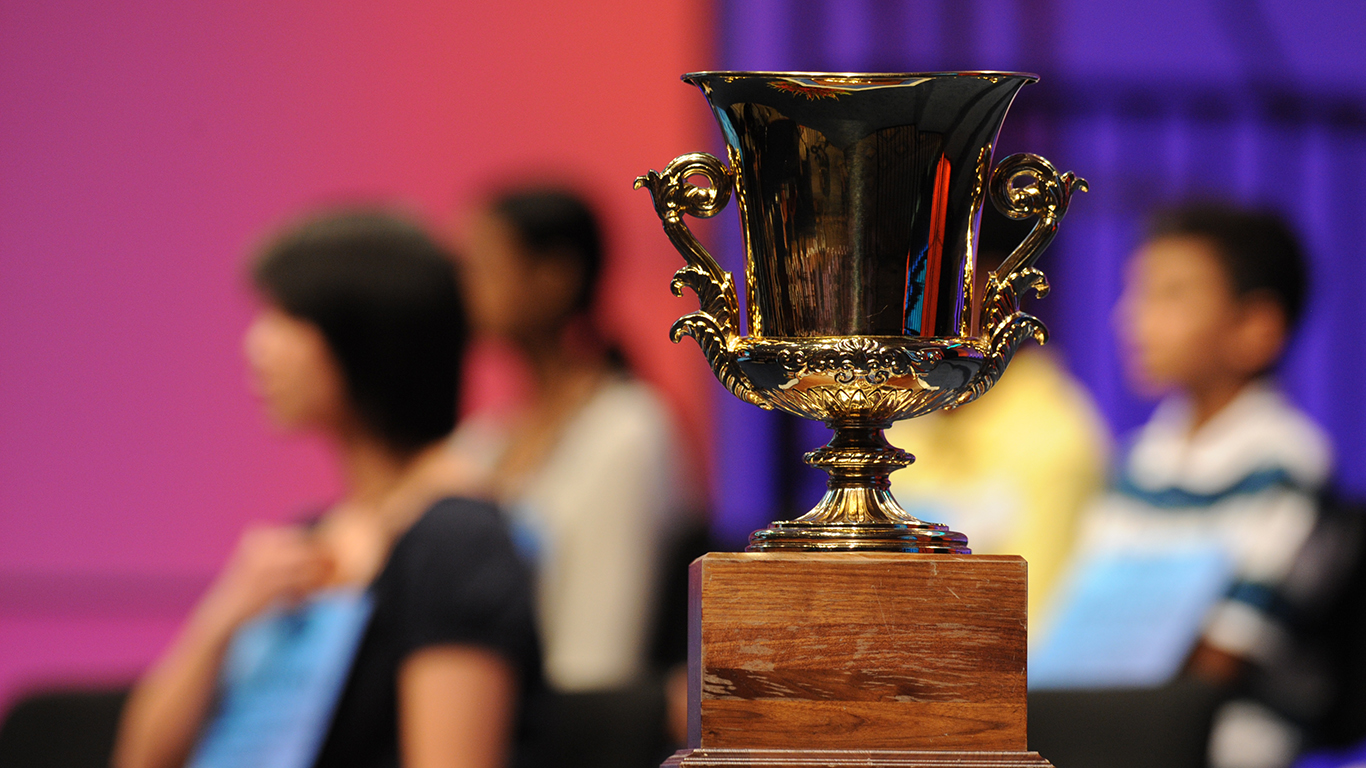
Published:
Last Updated:

Started in 1925, the Scripps National Spelling Bee is now televised nationally and students have gone from studying the dictionary to using highly paid coaches and computers.
The spellers that make up this competition come not only from the 50 states, but also the U.S. territories and other countries, including Canada, Mexico, China, Japan and New Zealand. In 1998, Jody-Anne Maxwell of Jamaica became the bee’s first non-American winner.
Just over half of the winners have been female (51%), and most are in their last year of competing (13 to 14 years old). Most winning words were nine letters in length, while the longest one was scherenschnitte (15 letters), spelled in 2015 by Vanya Shivashankar.
One of the most interesting trends in the bee in recent years, however, is the streak of Indian-American winners: 11 in a row and 19 in the last 23 years. The documentary “Breaking the Bee” examines this curiosity, which the filmmaker explained to CBS News as a “perfect storm of events,” including a change in immigration policy after 1965 that allowed for highly educated people to enter the United States, the creation of a community of spellers inspired by the early winners, and the bee’s televisation.
To identify every Spelling Bee winning word over the last 20 years, 24/7 Tempo consulted the Scripps Bee website. Definitions were also taken from the competition’s official site. For pronunciations, we checked online dictionaries such as Merriam-Webster.
Click here to read about every spelling bee winning word over the last 20 years.
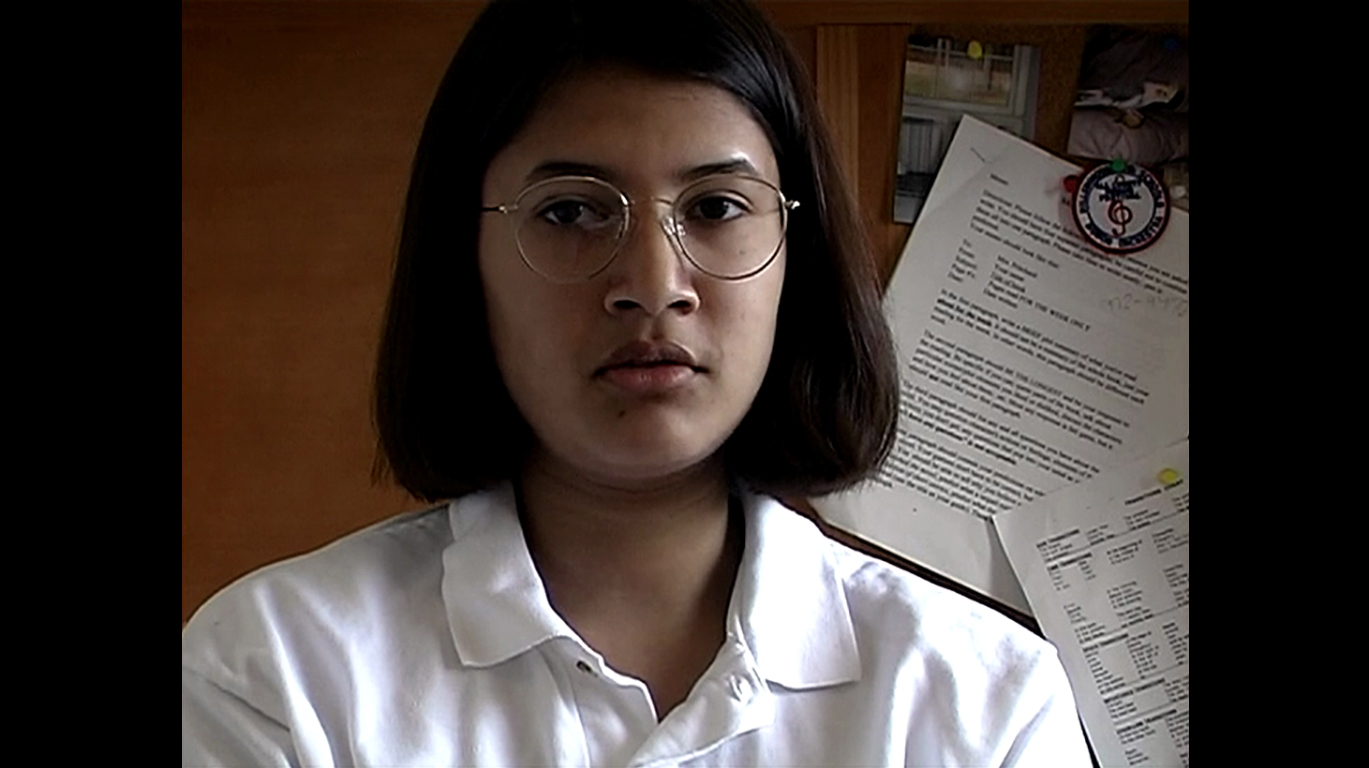
1999: Logorrhea
Definition: “pathologically excessive and often incoherent talkativeness.”
Pronunciation: log·or·rhea
Speller: Famous for her role in the 2002 Scripps Bee documentary “Spellbound,” Nupur Lala, who won at age 14, penned an essay nearly 20 years later to explain the importance of the competition. Currently pursuing a medical degree with a focus in neurology, Lala believes “that a major draw of the event is watching true meritocracy — and diversity — displayed.”
[in-text-ad]
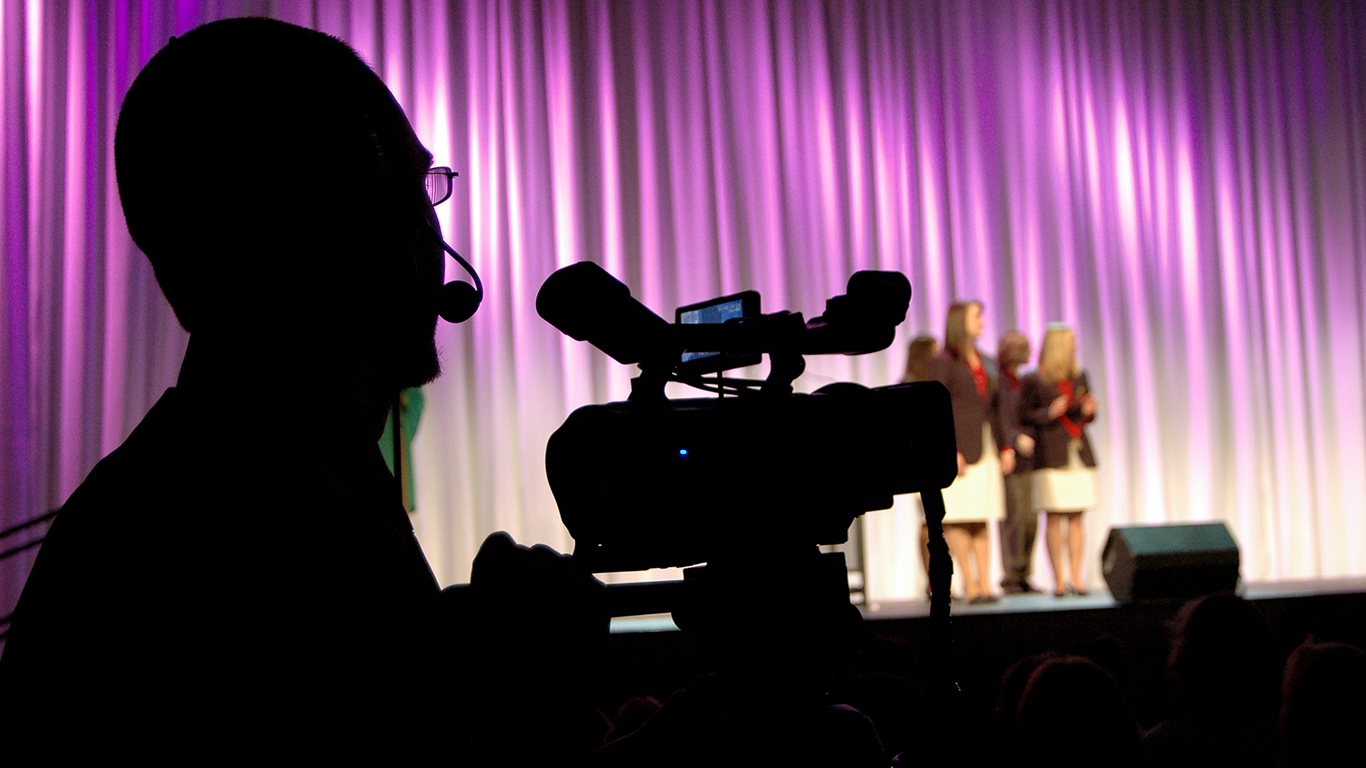
2000: Demarche
Definition: “any formal or informal representation or statement of views to a public official.”
Pronunciation: dé·marche
Speller: At 12 years old, George Abraham Thampy won on his third try after placing third and fourth in the previous two bees. He was also the runner-up in the National Geography Bee a week before the 2000 Spelling Bee. Thampy, of Maryland Heights, Missouri, was only the second home-schooled student to win the spelling contest, and credited his education with helping him win: “Spelling is not a subject taught in schools,” he said.
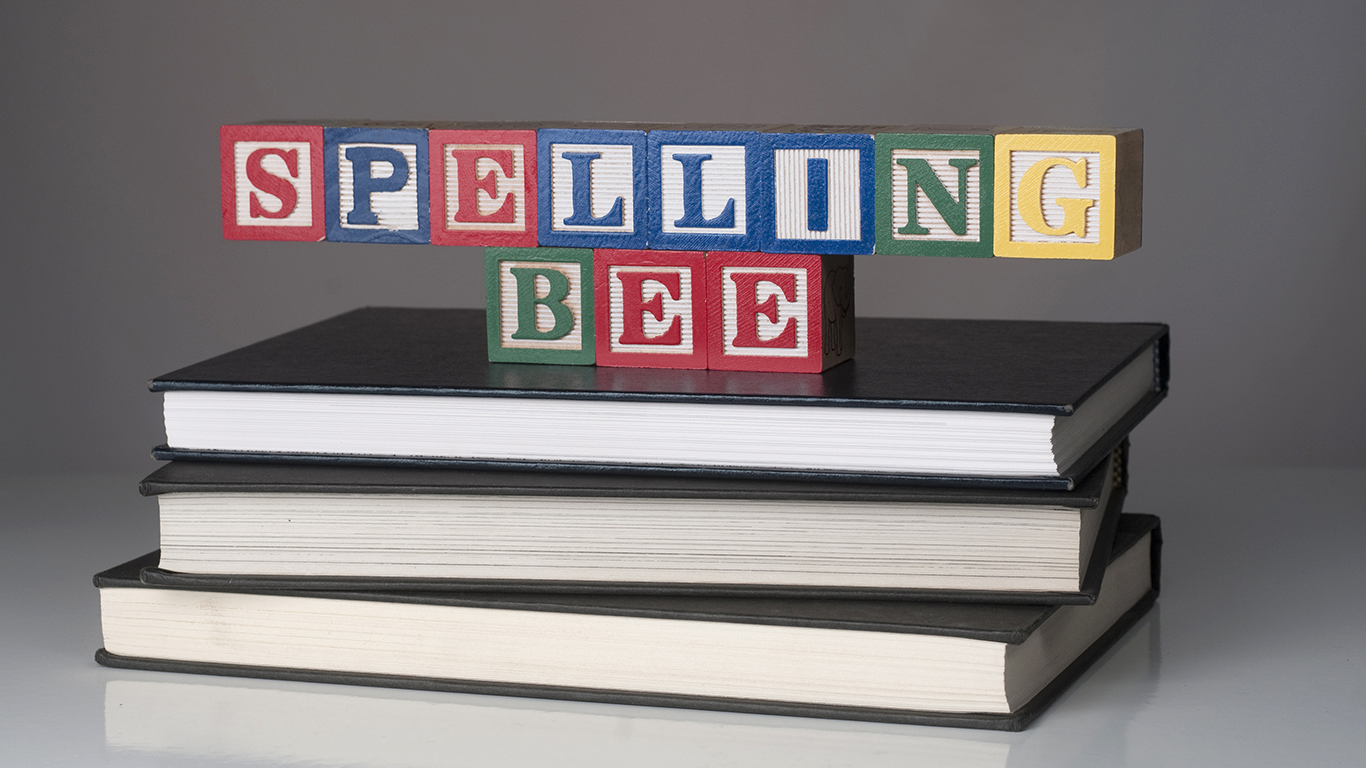
2001: succedaneum
Definition: “one that comes next after or replaces another in an office, position or role.”
Pronunciation: suc·ce·da·ne·um
Speller: Sean Conley of Anoka, Minnesota, won the bee this year after going for five rounds against another 13-year-old speller. Like Conley, his competitor was also participating in the
Scripps National Spelling Bee for the third time. But Conley was able to clinch the title with his correct spelling of “succedaneum,” while the runner-up was eliminated by the word “resipiscence.”
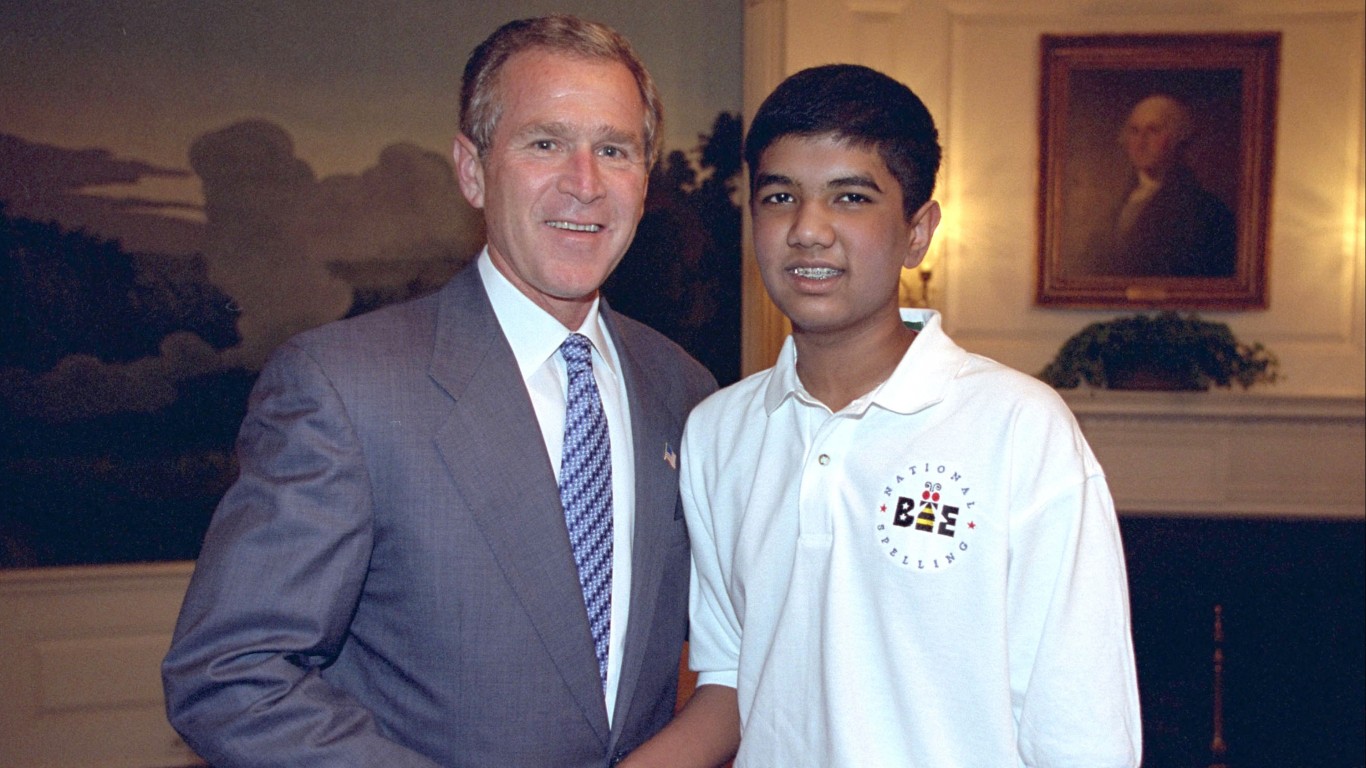
2002: Prospicience
Definition: “the act of looking forward : foresight.”
Pronunciation: pro·spi·cience
Speller: Pratyush Buddiga, a 13-year-old from Colorado Springs, Colorado, won $12,000 with his spelling of “prospicience” during the 2002 Scripps National Spelling Bee, but today he is competing for much higher stakes. Buddiga, now 29, is a recently retired poker player, with millions of dollars in wins, and is getting into cryptocurrency.
[in-text-ad-2]
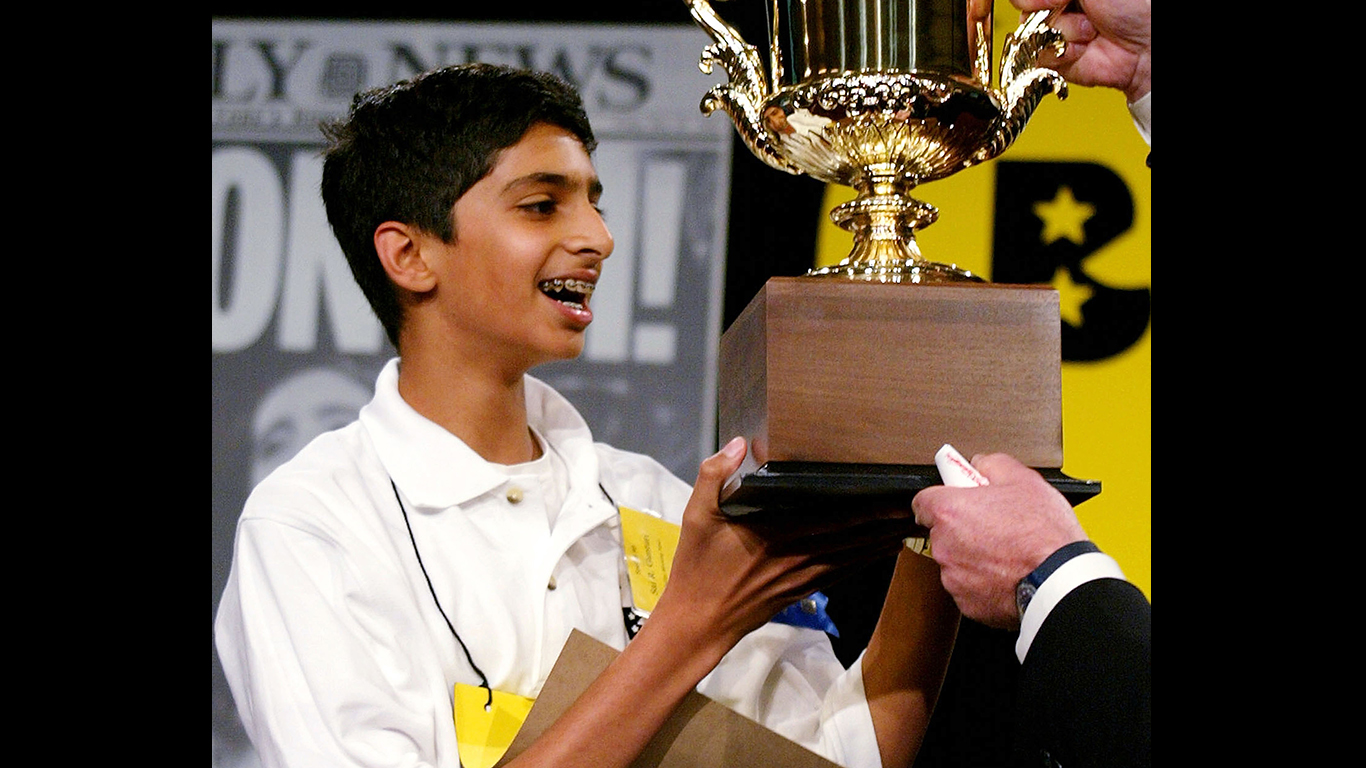
2003: Pococurante
Definition: “not concerned : indifferent : nonchalant.”
Pronunciation: po·co·cu·ran·te
Speller: It took four tries for Sai R. Gunturi of Dallas, Texas to win the Scripps Bee at 13 years old. He had previously tied for 32nd in 2000, 16th in 2001 and 7th in 2002. The scholar, who played the violin and studied Indian classical music, said he was almost laughing when he won because he had studied “pococurante” previously. After finally winning the $12,000 prize, Gunturi exclaimed, “‘I’m going to buy a lot of video games, like, a lot.”
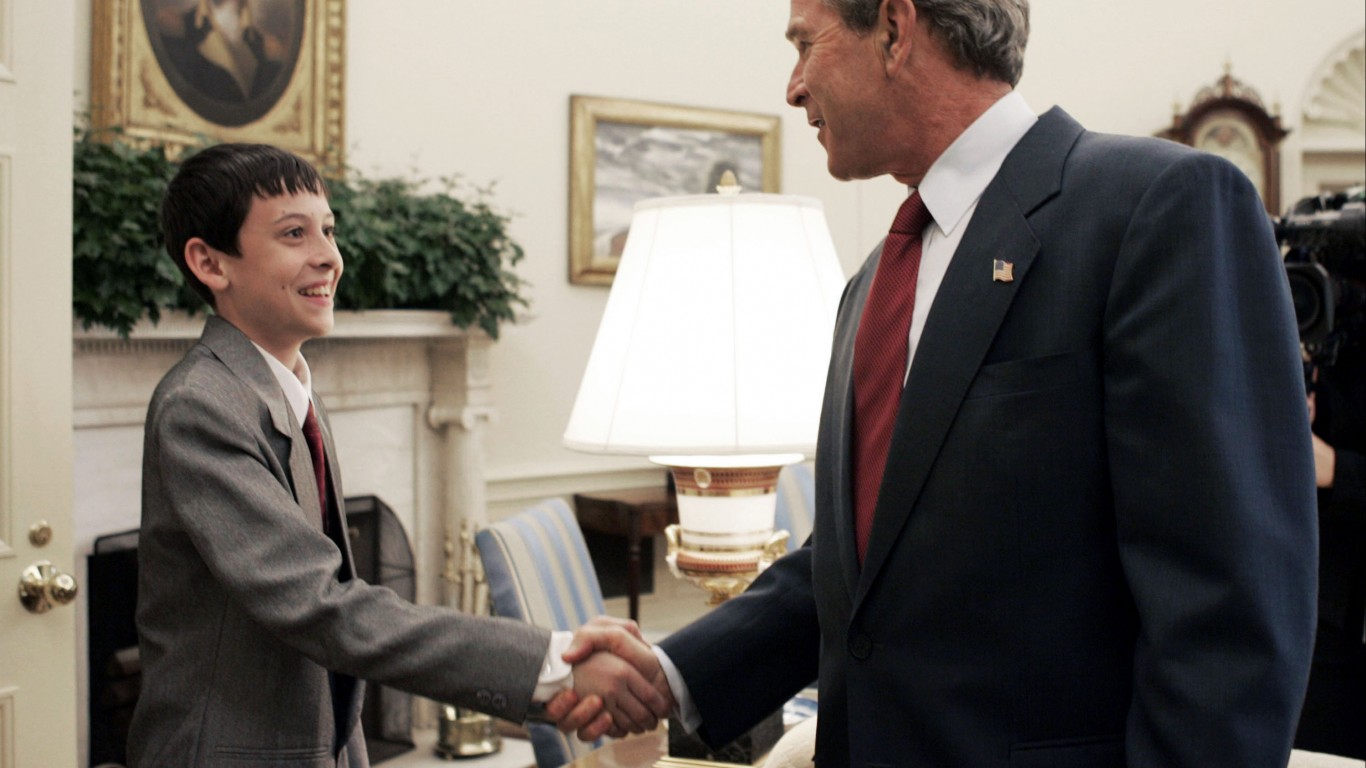
2004: Autochthonous
Definition: ‘indigenous, native, aboriginalâused especially of floras and faunas.”
Pronunciation: au·toch·tho·nous
Speller: David Tidmarsh, 14, of South Bend, Indiana, may have been the 2004 National Spelling Bee winner, but the runner-up that year had the most memorable moment. Akshay Buddiga, 13, famously fainted on stage as he attempted to spell “alopecoid.” There was immense pressure on Buddiga that year to become the first sibling to win, following his brother Pratyush Buddiga in 2002. In a dramatic recovery, Buddiga quickly stood up and spelled the word correctly. Tidmarsh did go on to parody the moment on the “Late Show with David Letterman,” pretending to faint as Letterman tested his spelling.
[in-text-ad]
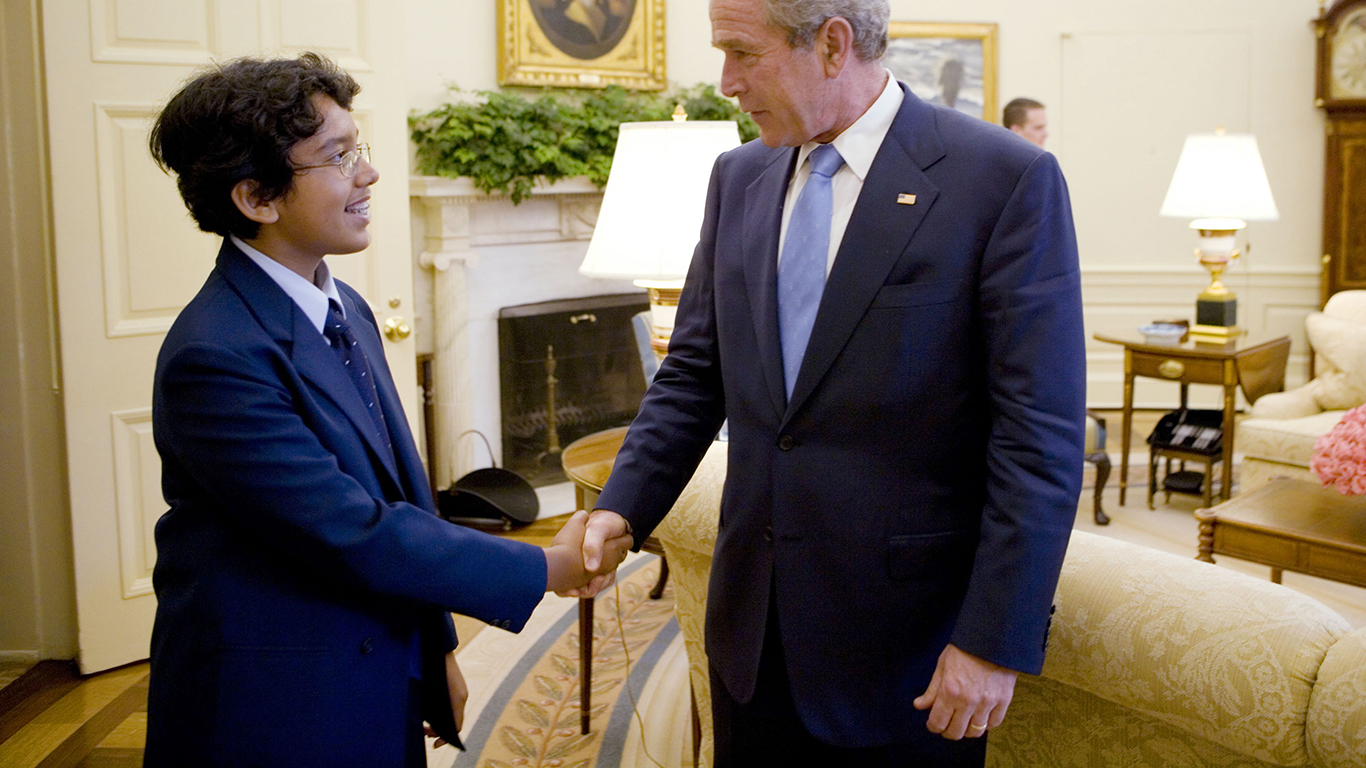
2005: Appoggiatura
Definition: “an accessory embellishing note or tone preceding an essential melodic note or tone and usually written as a note of smaller size.”
Pronunciation: ap·pog·gia·tu·ra
Speller: Anurag Kashyap went from 47th place in 2004’s Scripp Spelling Bee to winning the competition the following year at age 13. Born in Muzaffarpur, India, and raised in Poway, California, Kashyap decided not to stop with spelling. With encouragement from his mom, he tried out for the Jeopardy Teen Tournament, which he ended up winning, along with a $75,000 prize.
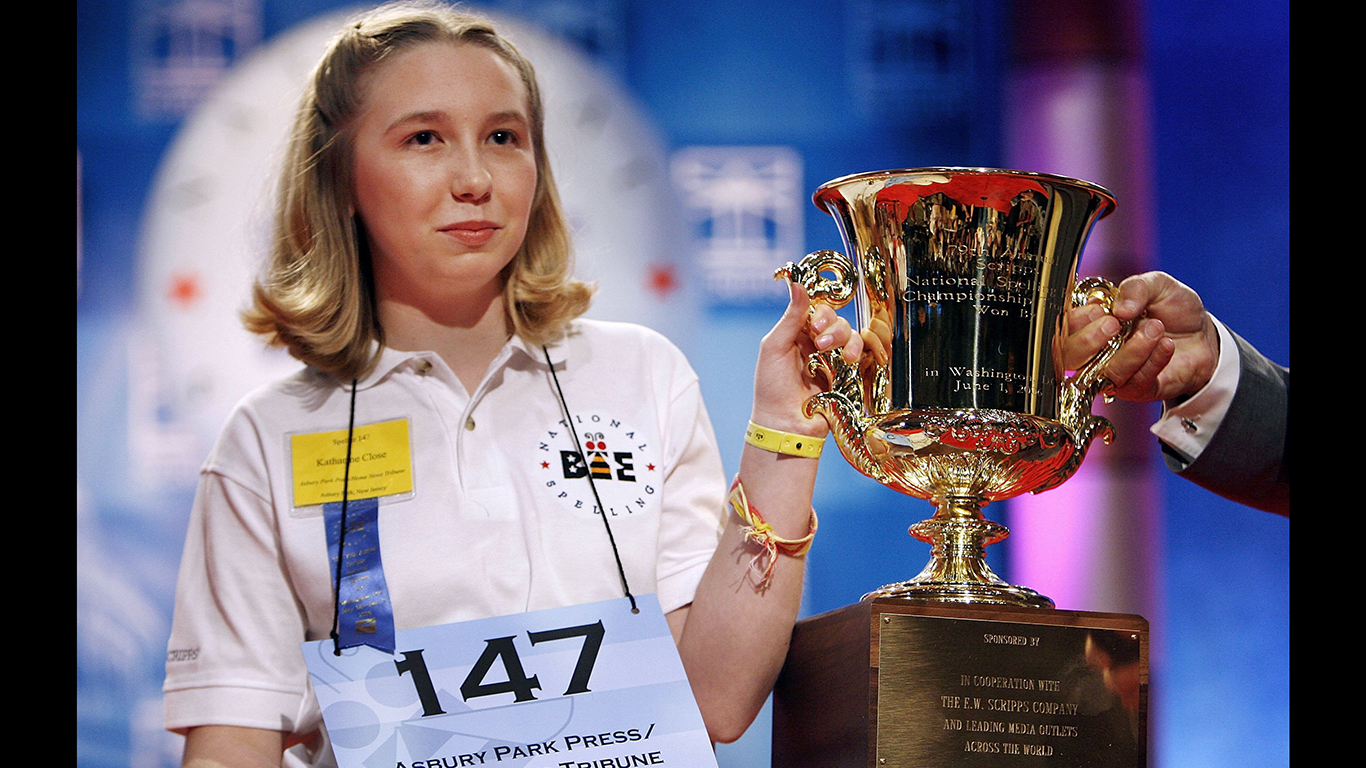
2006: Ursprache
Definition: “a parent language; especially : one reconstructed from the evidence of later languages.”
Pronunciation: Ur·spra·che
Speller: It’s not unusual for former National Spelling Bee champions to write about the lessons learned from the competition. But journalist Kerry Close has shared several insights about her unique experience. The first winner when the bee was broadcast nationally, it took her four tries to win at age 13. Though she says it comes down to luck in the end, the bee did teach her many valuable lessons — such as persistence and grace under pressure — that have helped in her career.
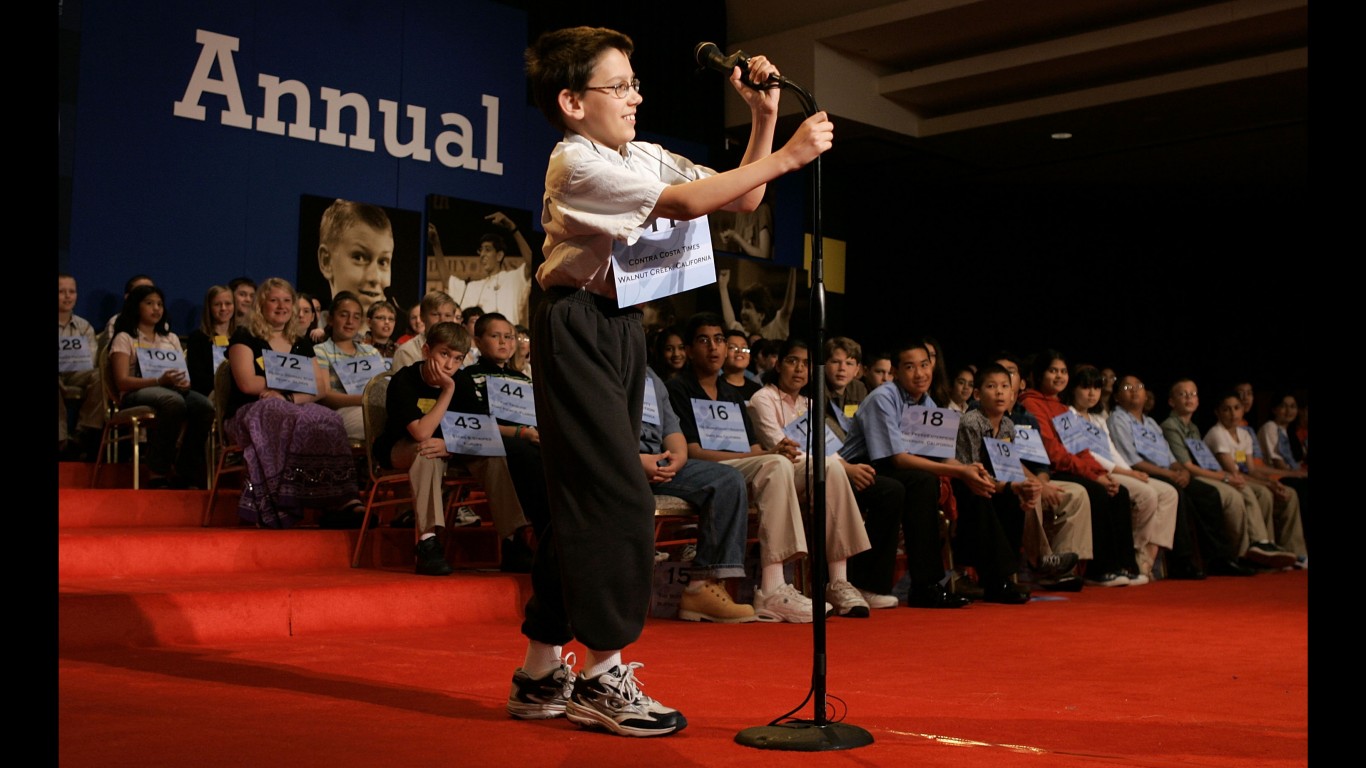
2007: Serrefine
Definition: “a small forceps for clamping a blood vessel.”
Pronunciation: serre·fine
Speller: Evan M. O’Dorney, 13, of Danville, California, is most famous not for his win, but for the interview after the spelling bee. Speaking live to CNN’s Kiran Chetry, O’Dorney said he wasn’t surprised to win, corrected how she pronounced his name, and told her to ask his mom what she thought. A doctoral candidate at Princeton, O’Dorney says he still receives emails about the interview.
[in-text-ad-2]
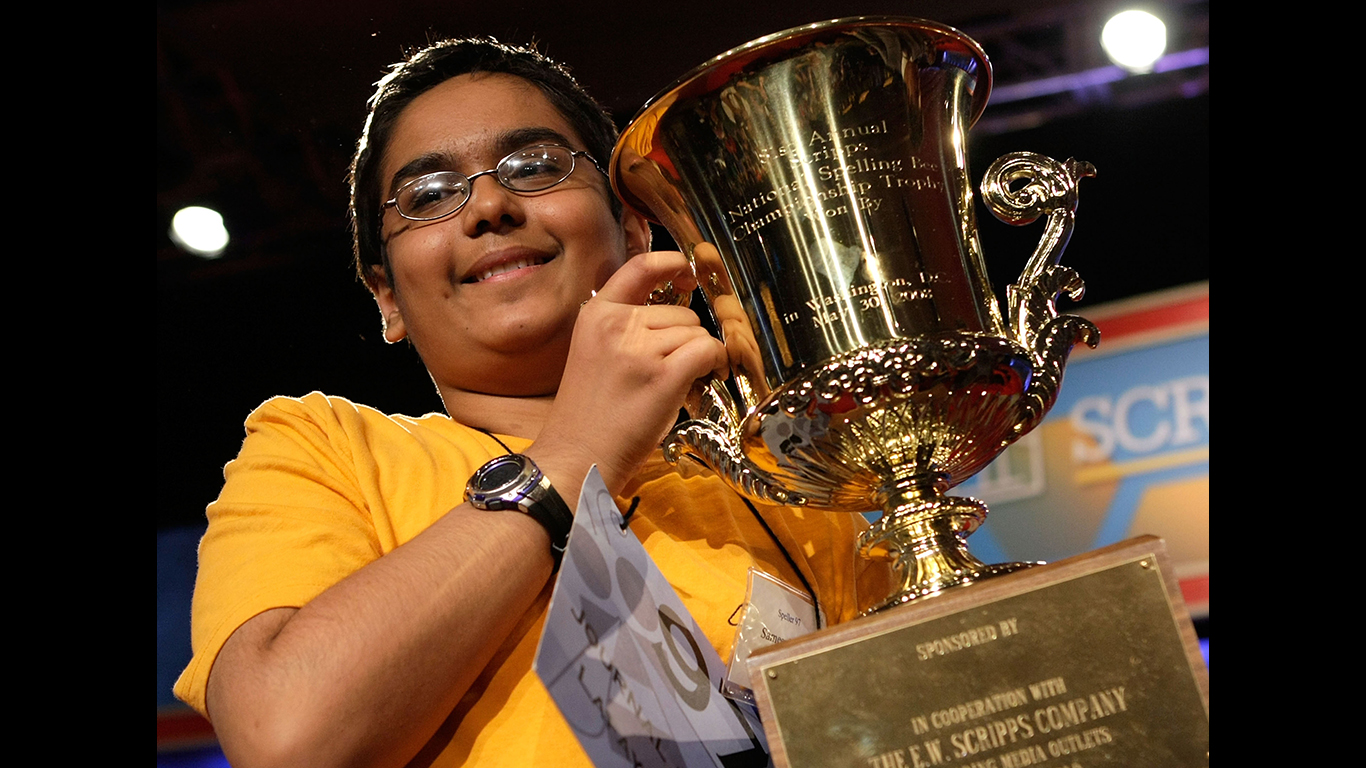
2008: guerdon
Definition: “something that one has earned or gained : a reward : a recompense : a requital.”
Pronunciation: guer·don
Speller: Sameer Mishra created one of the bee’s most viral moments when he misheard the word “numnah” (a felt or sheepskin pad placed between a horse’s back and the saddle to prevent chafing”), thinking it was “numnuts.” Mishra, who graduated from Columbia University in 2016 with a degree in economics and statistics, credits the spelling bee with giving him a good work ethic and helping him come out of his shell, with all the attention he received following his win.
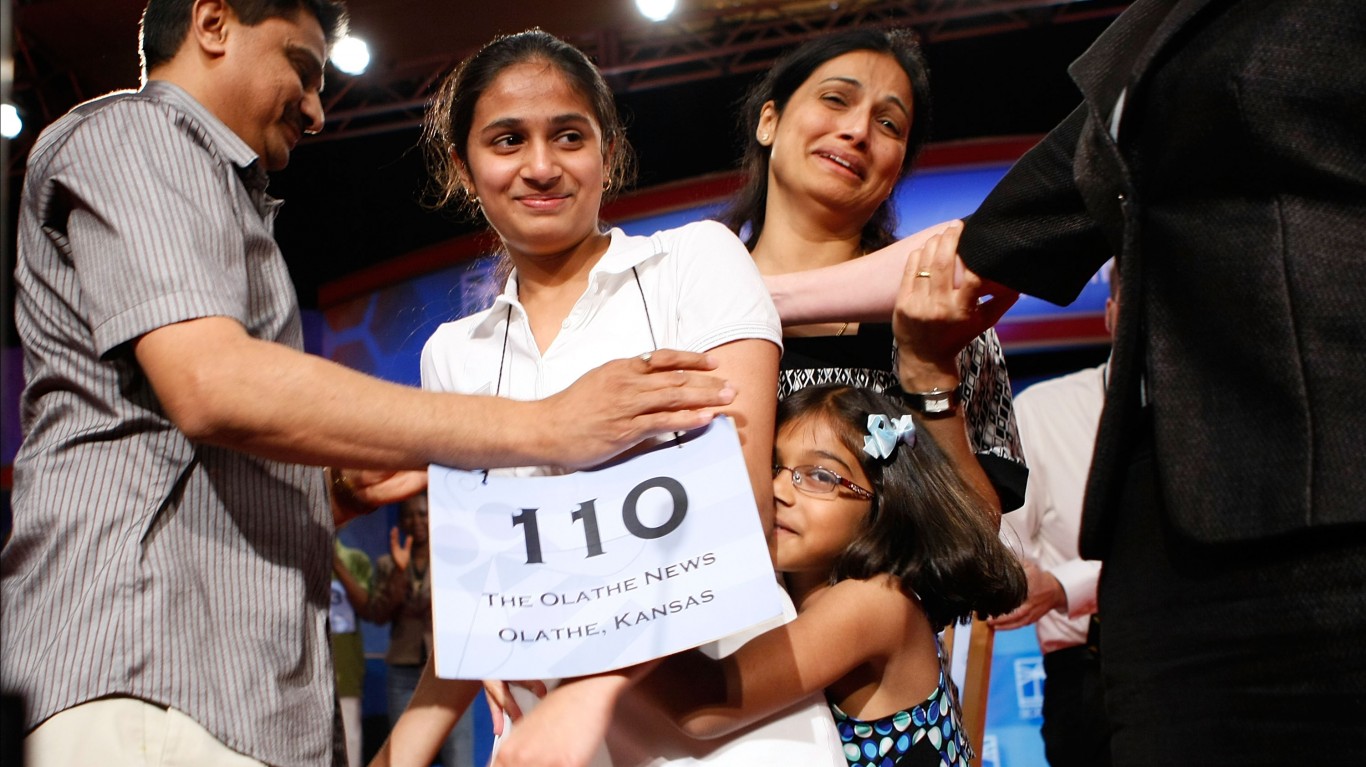
2009: Laodicean
Definition: “lukewarm or indifferent in religion or politics.”
Pronunciation: La·od·i·ce·an
Speller: Kavya Shivashankar, 13, of Olathe, Kansas, took four tries to win the spelling bee. An article about her win at the time noted her little sister, Vanya, supporting her in the audience with a sign reading: “Go Kavya!” Six years later, Vanya would go on to win the bee as well, while Kavya would go on to study at Columbia University. The girls’ winnings are helping both of them pay for college.
[in-text-ad]
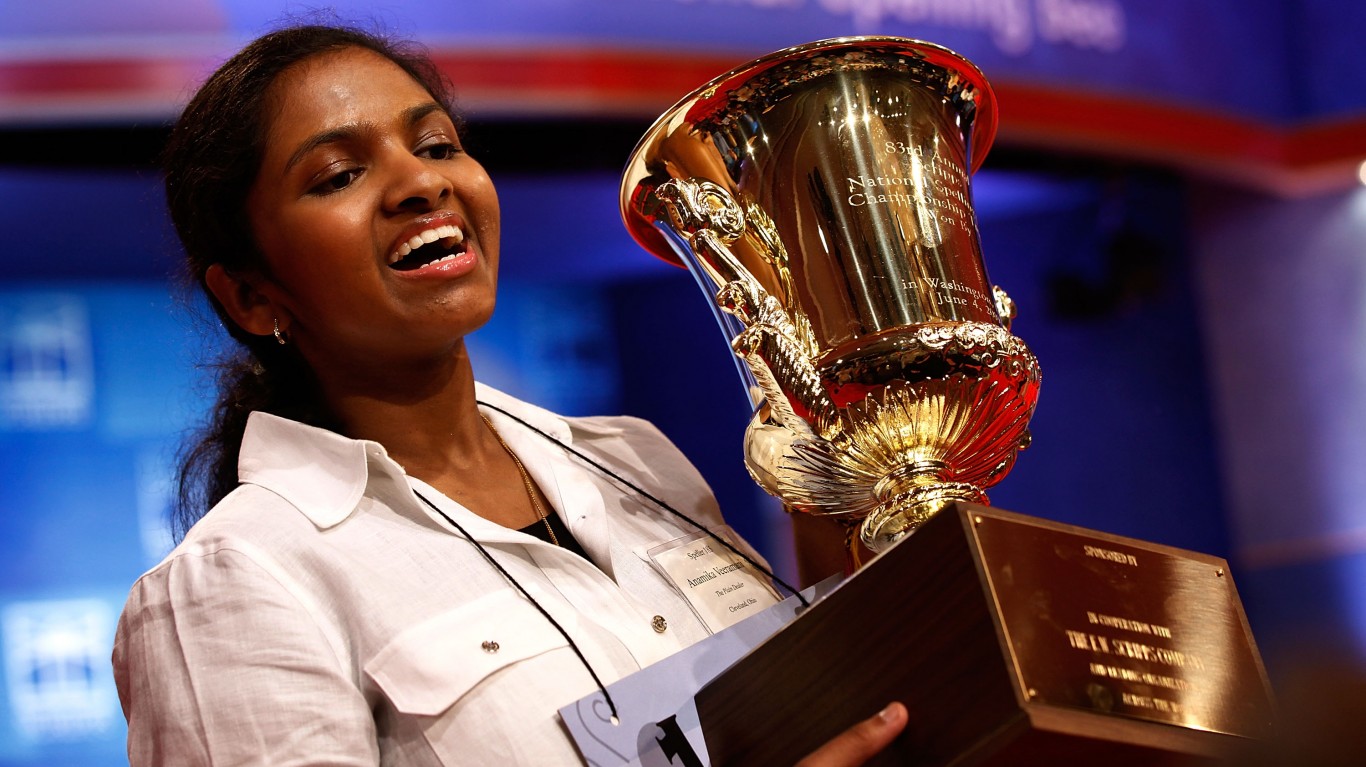
2010: Stromuhr
Definition: “an instrument for measuring the flow of viscous substances designed to measure the amount and speed of blood flow through an artery.”
Pronunciation: strom·uhr
Speller: “In the spelling bee, you really learn how to deal with failure. And dealing with those things gracefully is really important to living a good life,” said Anamika Veeramani, seven years after her win. At 14, she clinched the title after losing the year before. Today, she is pursuing a medical degree at Harvard after finishing her undergraduate degree at Yale in just three years.
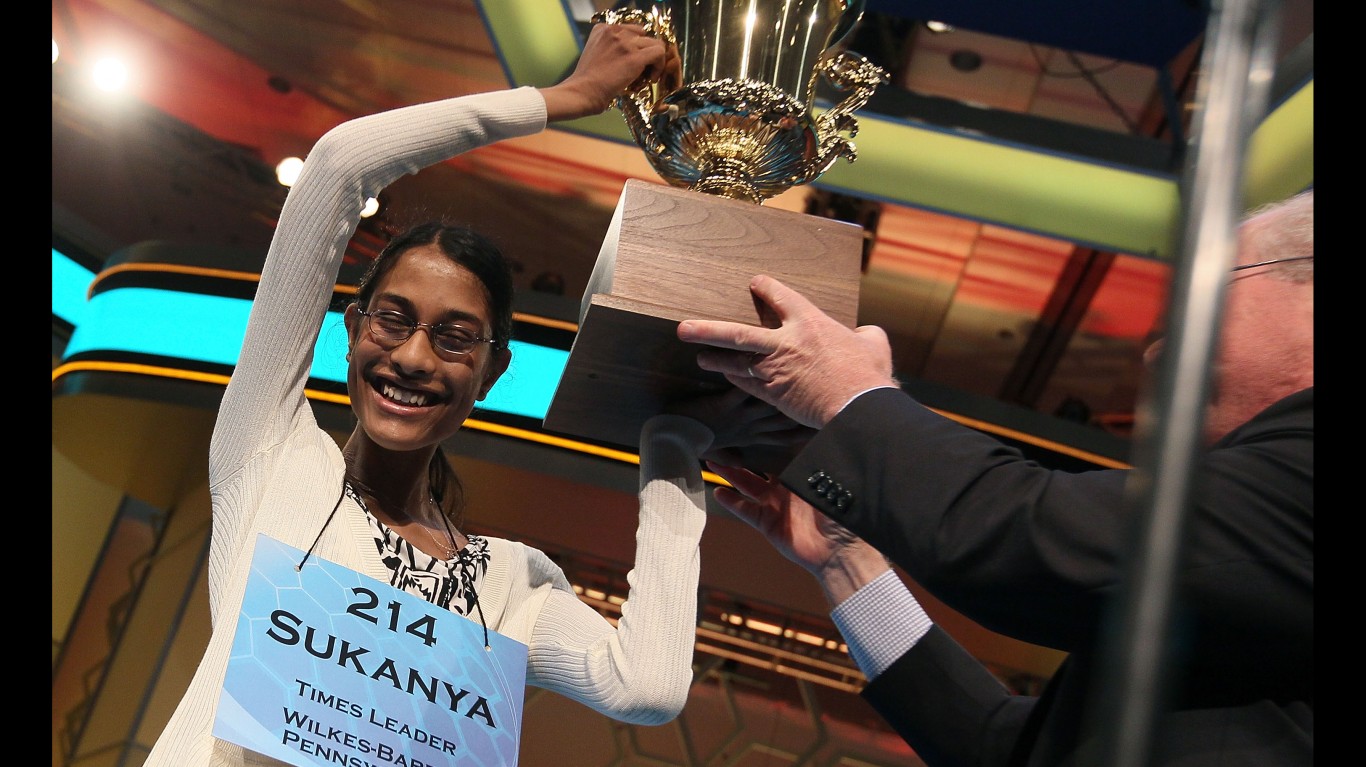
2011: Cymotrichous
Definition: “having the hair wavy.”
Pronunciation: cy·mot·ri·chous
Speller: In a bee that went well over the time scheduled, five spellers went for 21 rounds without a mistake, but eventually Sukanya Roy, 14, of South Abington Township, Pennsylvania won with “cymotrichous.” It was the third try for Roy, who had tied for 12th in 2009 and 20th in 2010.
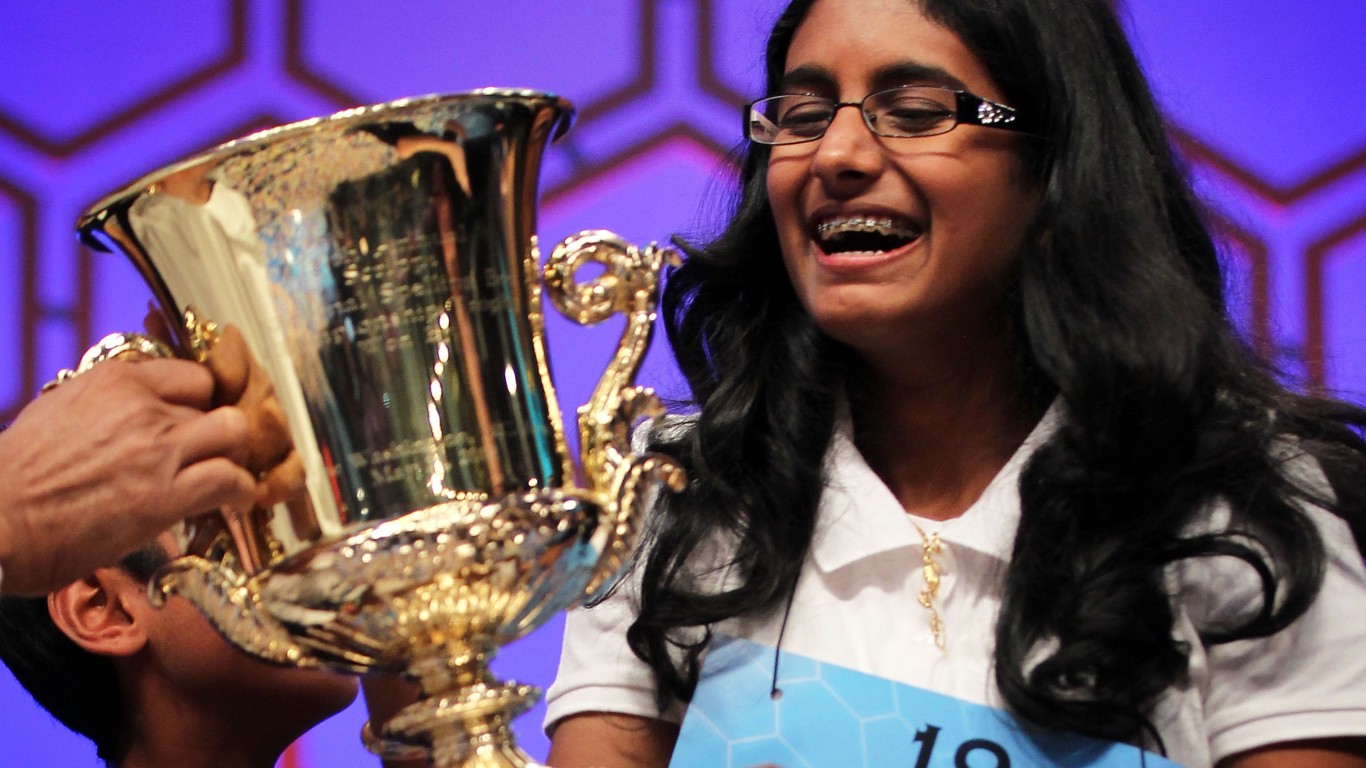
2012: Guetapens
Definition: “an ambush : a snare : a trap.”
Pronunciation: guet·a·pens
Speller: Snigdha Nandipati, 14, of San Diego, said she “knew it; I’d seen it before,” of her winning word “guetapens.” But she also added that it was not an easy win, requiring 10 to 12 hours on weekends and six hours on weekdays of studying. Today, the Yale undergrad is using those studying skills to coach other future spelling champions.
[in-text-ad-2]
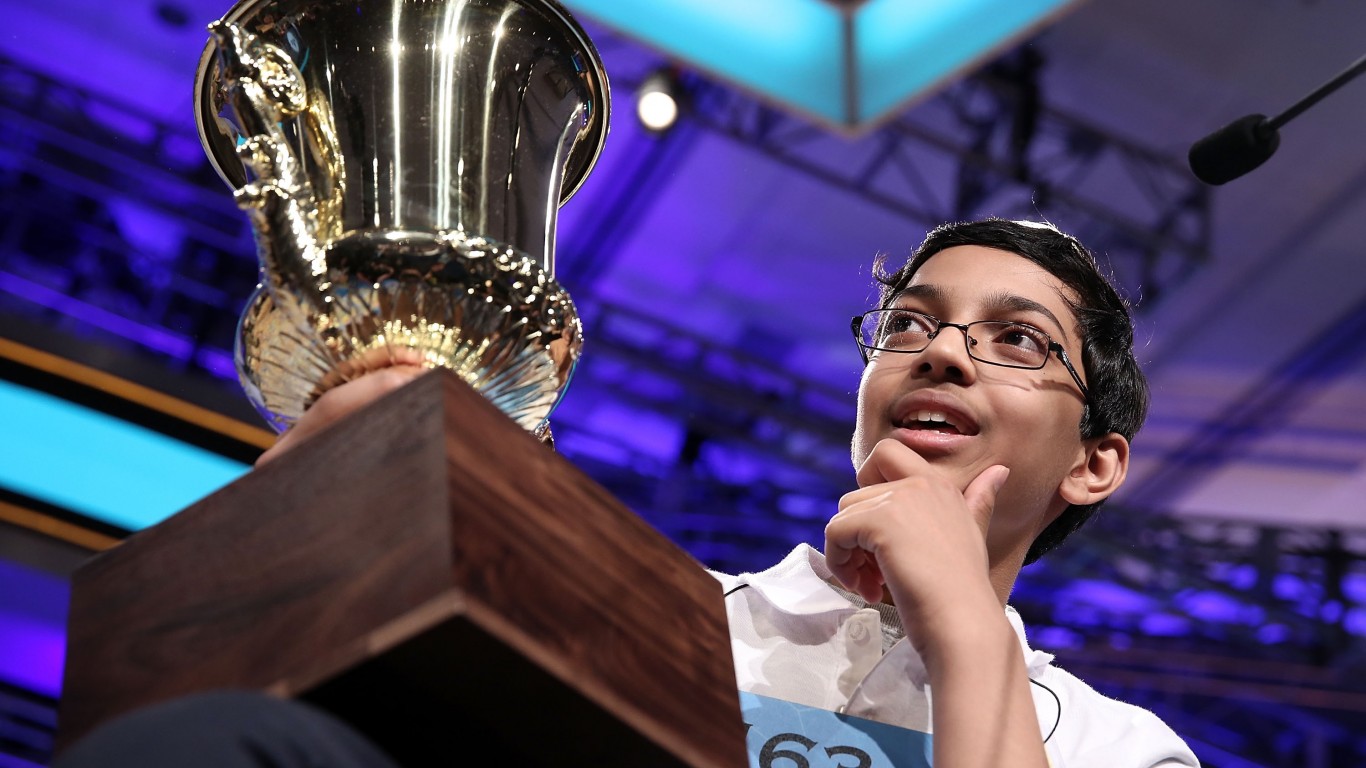
2013: Knaidel
Definition: “a small mass of leavened dough cooked by boiling or steaming (as with soup, stew or fruit with which it is to be served) : a dumpling.”
Pronunciation: knai·del
Speller: Arvind Mahankali, of Queens, New York, finally became the spelling bee champion after two consecutive third-place finishes. His reaction, however, was subdued, when his big win happened. One of the bee’s viral TV moments, Mahankali remained emotionless as confetti rained down around him. “At that time, it didn’t register that I’d won,” he later explained.
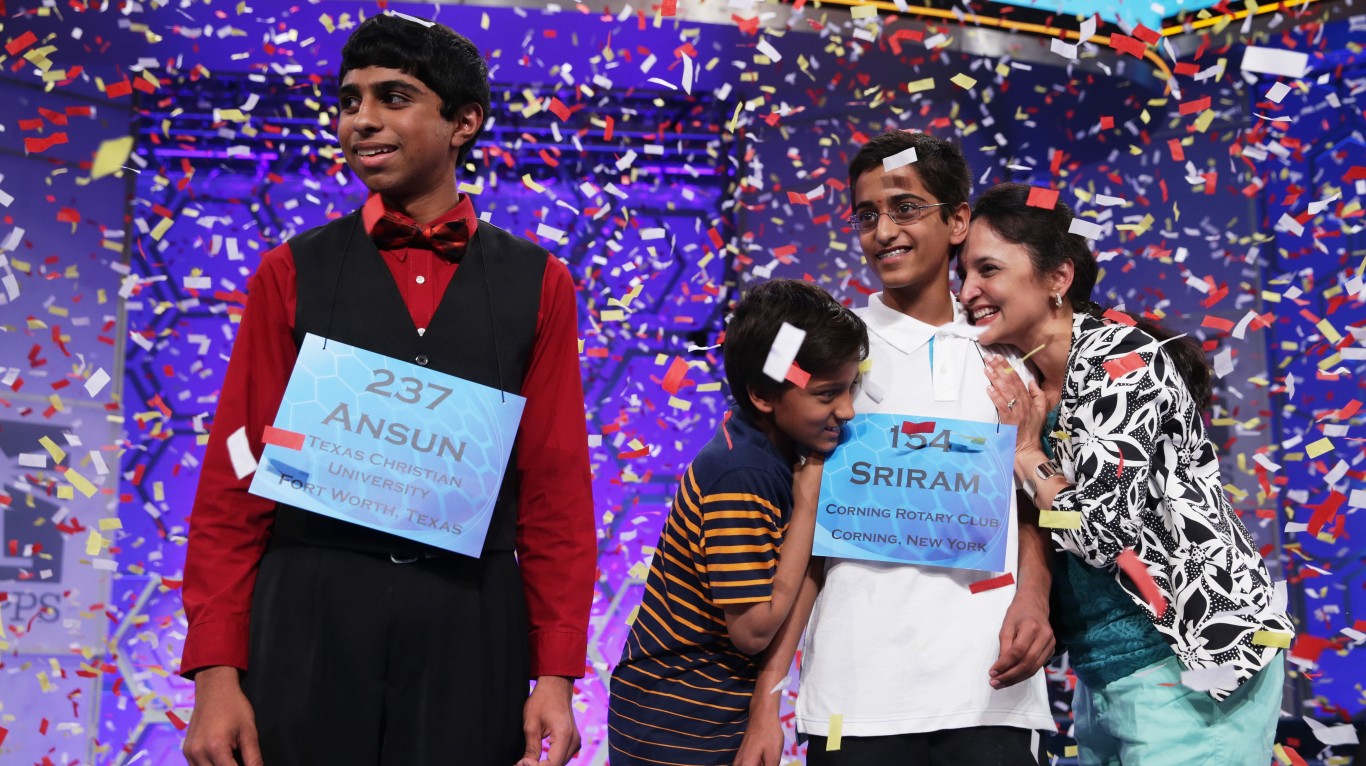
2014: Feuilleton
Definition: “a part of a European newspaper or magazine devoted to material designed to entertain the general reader: a feature section.”
Pronunciation: feuil·le·ton
Speller: The 2014 Scripps National Spelling Bee ended in the first tie since 1962. It was just the fourth time in the bee’s history, yet ties would follow for two more consecutive years, leading to rule changes so ties are not as likely. Ansun Sujoe, 13, from Fort Worth, Texas, and his co-speller also continued the bee’s streak of Indian-American winners, for the seventh time in a row.
[in-text-ad]
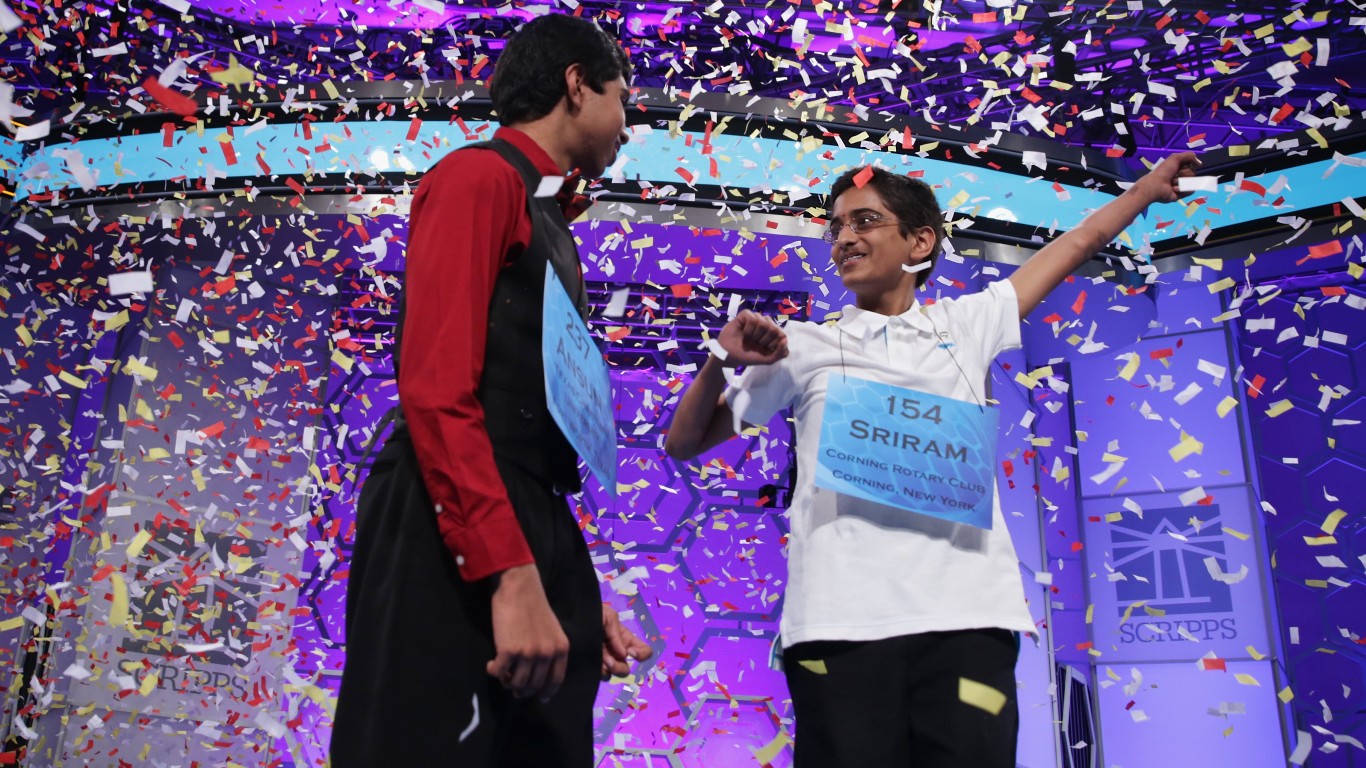
2014: Stichomythia
Pronunciation: sticho·myth·ia
Definition: “dialogue especially of altercation or dispute delivered in alternating lines (as in classical Greek drama).”
Speller: Sriram Hathwar, of Painted Post, New York, first appeared in the Scripps Bee at age 8, making him the youngest speller ever to compete. After five tries, he finally won — but with one of the first ties in decades. His younger brother, Sriram, would win only two years later — and in another tie.
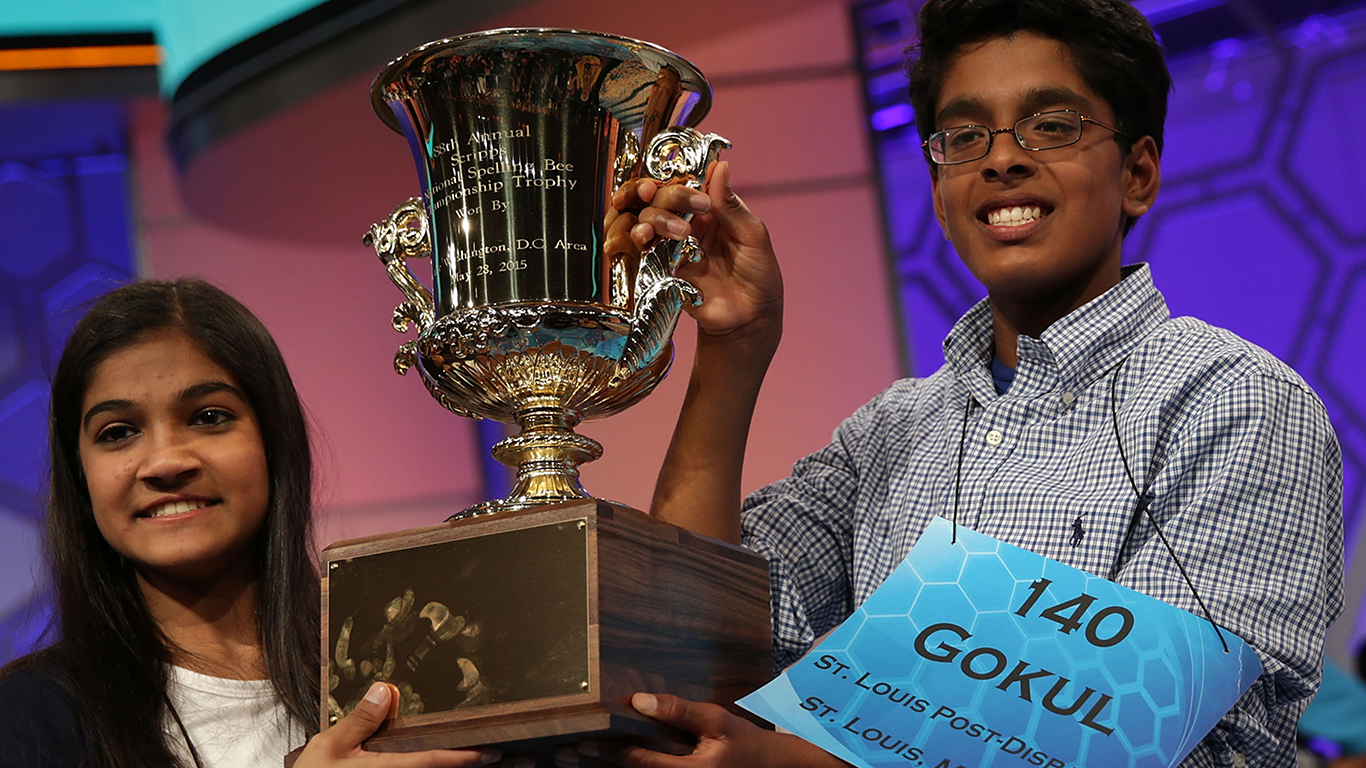
2015: Nunatak
Definition: “a hill or mountain completely surrounded by glacial ice.”
Pronunciation: nun·a·tak
Speller: For the second year in a row, the National Spelling Bee ended in a tie. Gokul Venkatachalam, 14, said of his win, “I’ve dealt with defeat, and I’m finally happy to have success.” Venkatachalamn wore a LeBron James jersey underneath his shirt during the final round, and his hero sent him a pair of autographed shoes following the bee.
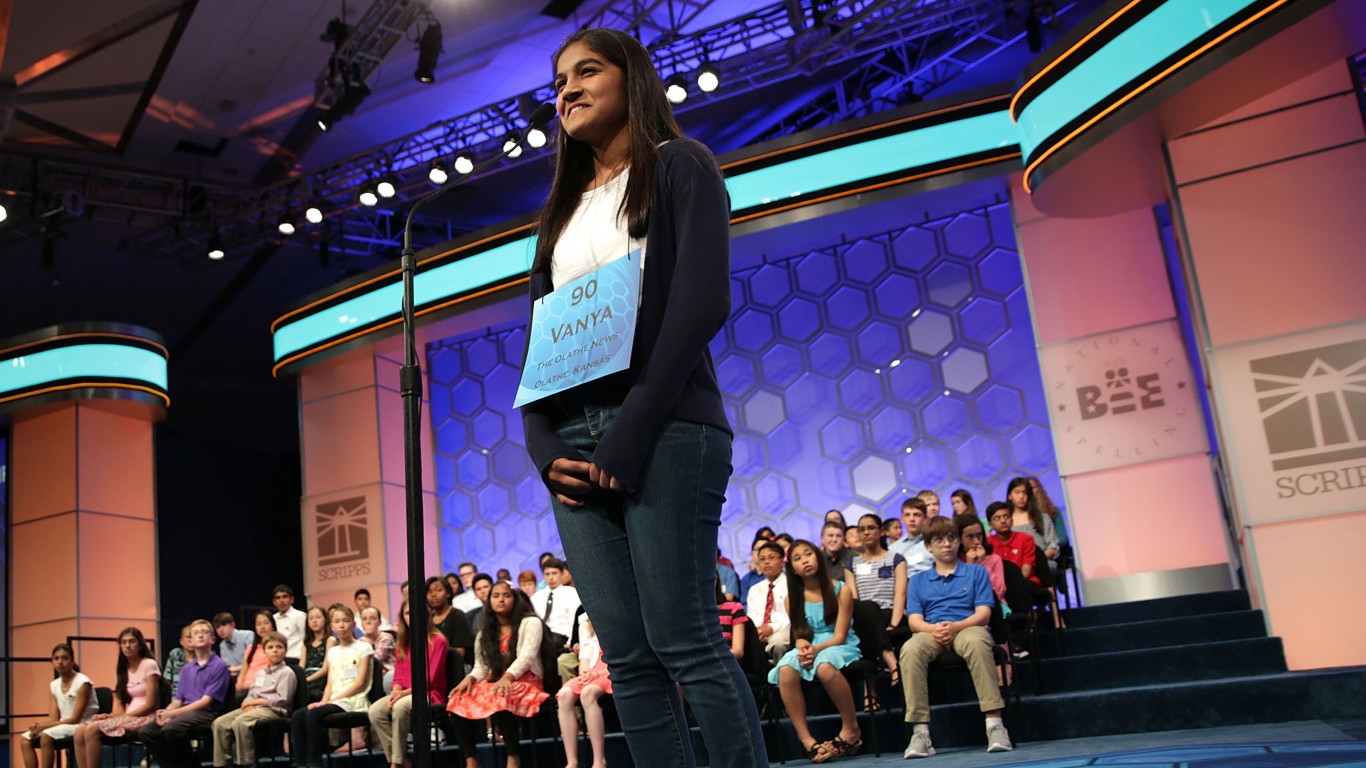
2015: scherenschnitte
Definition: “the art of cutting paper into decorative designs.”
Pronunciation: sche·ren·schnit·te
Speller: Following her sister’s 2009 win, Vanya Shivashankar became a spelling champion at 12 years old. Her father, elated at having two daughters win the bee, put on a specially made T-shirt for the moment on live TV that read “The Beefather.”
[in-text-ad-2]
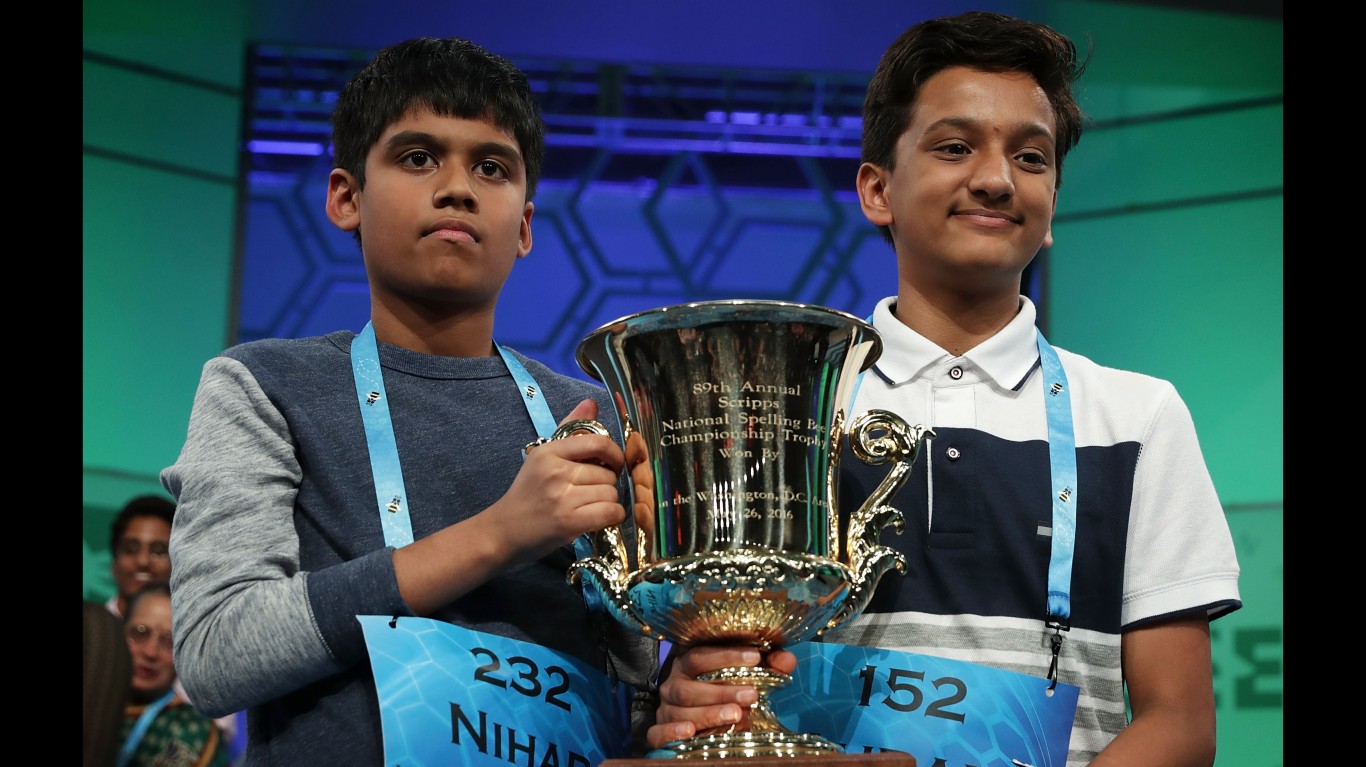
2016: Gesellschaft
Definition: “a rationally developed mechanistic type of social relationship characterized by impersonally contracted associations between persons.”
Pronunciation: ge·sell·schaft
Speller: Nihar Janga, 11, of Houston, Texas, was one of the more entertaining spelling champs. He liked to throw definitions at the judges, clap at opponents and threw up an X, the signature move one of his inspirations, Dallas Cowboys wide receiver Dez Bryant, made when he won.
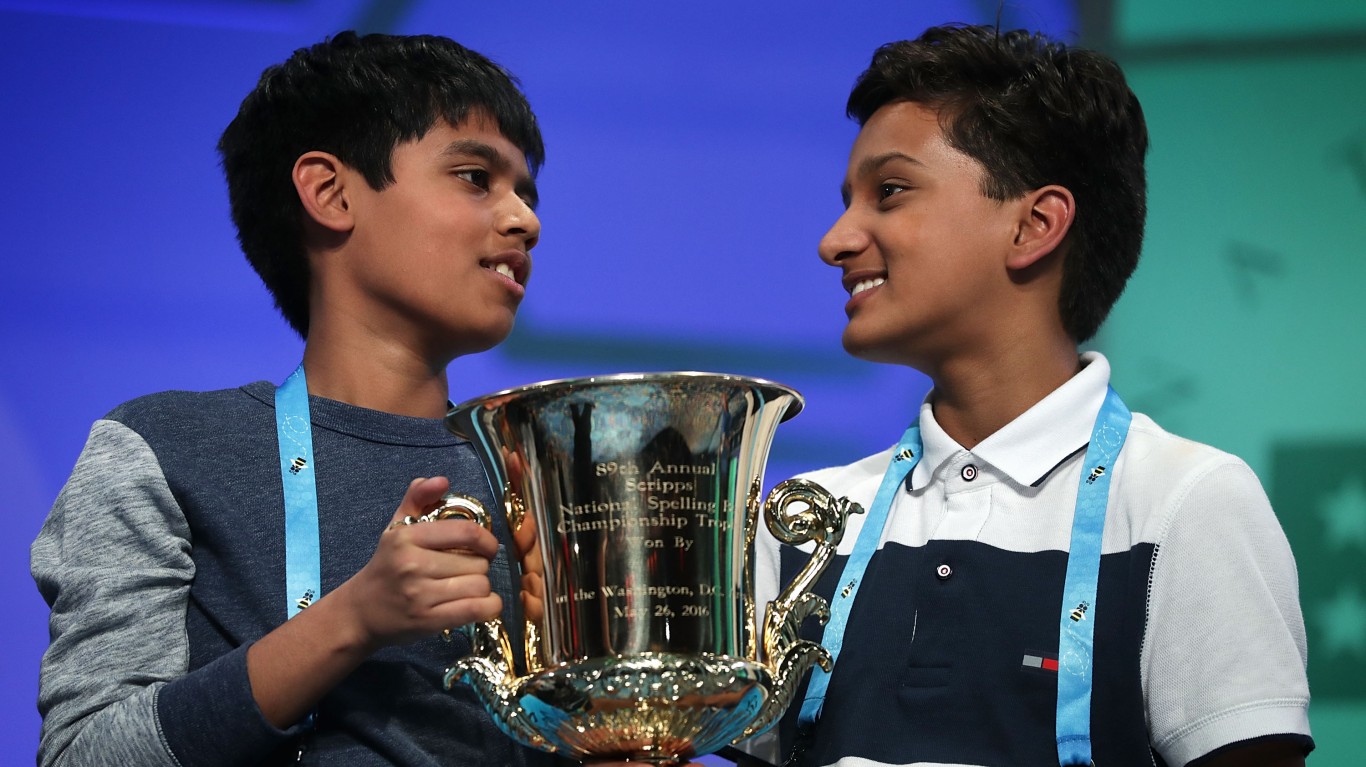
2016: Feldenkrais
Definition: “used for a system of aided body movements intended to increase body awareness and ease tension.”
Pronunciation: Fel·den·krais
Speller: It’s rare for two siblings to win the Scripps National Spelling Bee, but it’s even rarer for them both to win with ties. Jairam Hathwar, 13, of Painted Post, New York, won just two years after his brother Sriram took the title.
[in-text-ad]
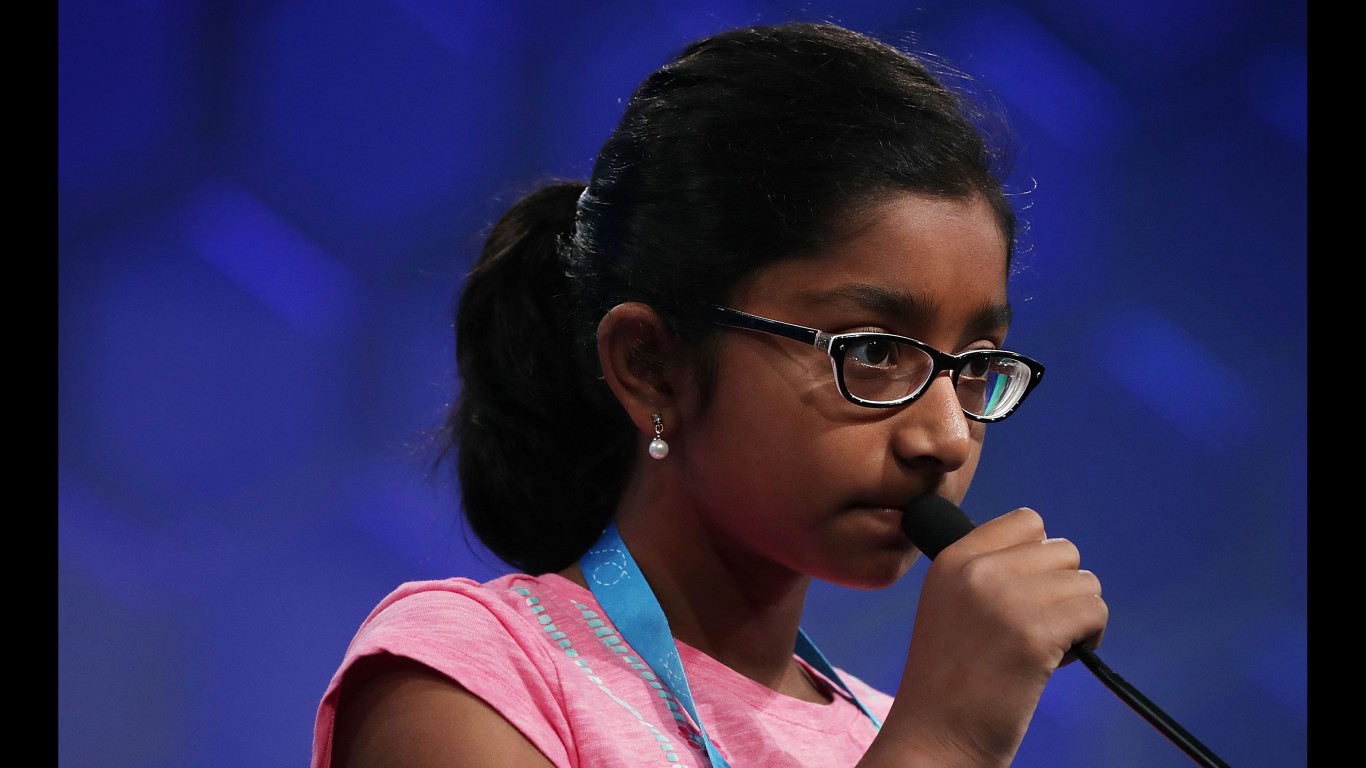
2017: Marocain
Definition: “a dress fabric that is made with a warp of silk or rayon and a filling of other yarns and is similar to but heavier than canton crepe.”
Pronunciation: mar·o·cain
Speller: After three straight years of ties, the Scripps Spelling Bee added a tiebreaker test in 2017. Though the top two spellers went for 21 rounds, they didn’t make it to the allotted 25, and in the end Ananya Vinay, 12, of Fresno, California, was crowned the winner. Last spring, she coached her neighbor to a win in the Fresno County Scripps Spelling Bee, and a spot in the national competition.
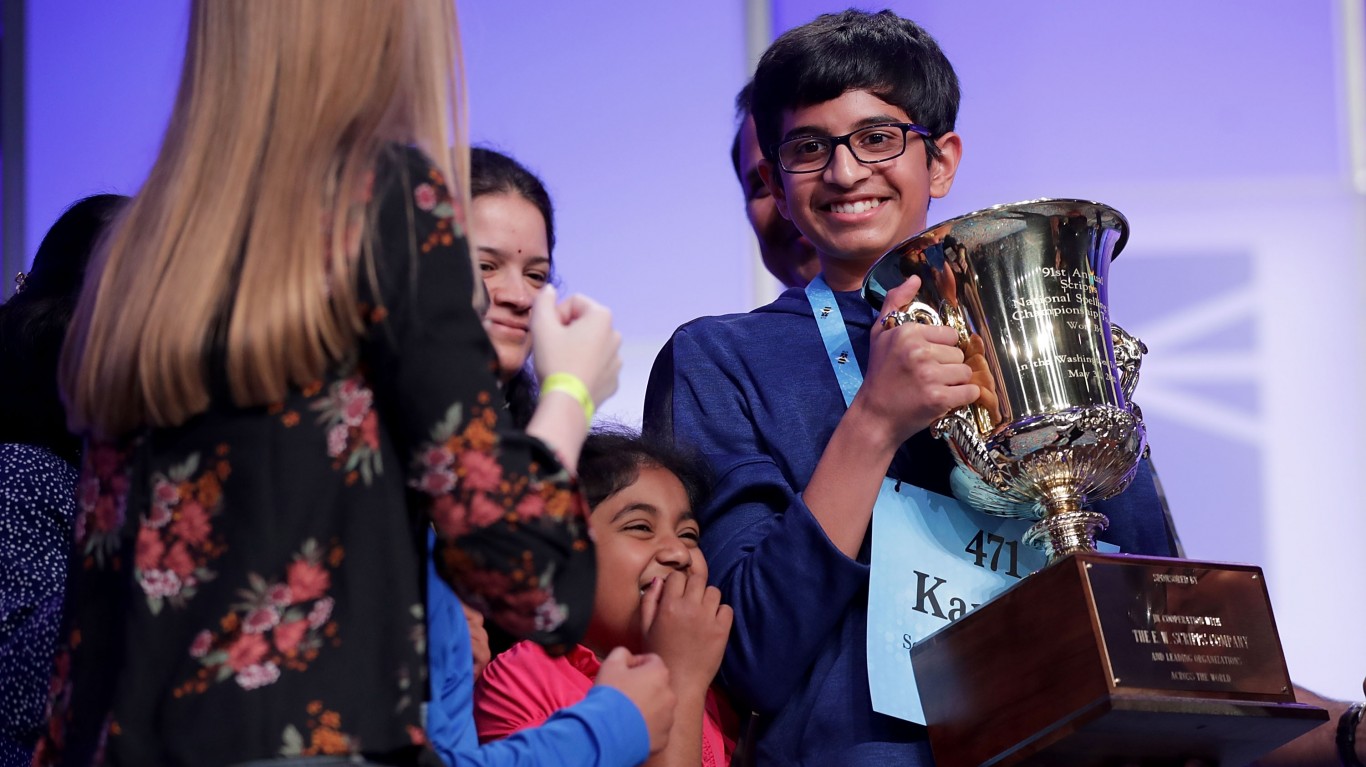
2018: koinonia
Definition: “intimate spiritual communion and participative sharing in a common religious commitment and spiritual community.”
Pronunciation: koi·no·nia
Speller: Karthik Nemmani, 14, the most recent winner of the Scripps National Spelling Bee, spent hours studying each day to win the competition. The amount of preparation isn’t different from years earlier, but now there are coaches, computers and statistical analysis. His 16-year-old coach sees her time in spelling bees as “a different era.”
Credit card companies are handing out rewards and benefits to win the best customers. A good cash back card can be worth thousands of dollars a year in free money, not to mention other perks like travel, insurance, and access to fancy lounges. See our top picks for the best credit cards today. You won’t want to miss some of these offers.
Flywheel Publishing has partnered with CardRatings for our coverage of credit card products. Flywheel Publishing and CardRatings may receive a commission from card issuers.
Thank you for reading! Have some feedback for us?
Contact the 24/7 Wall St. editorial team.